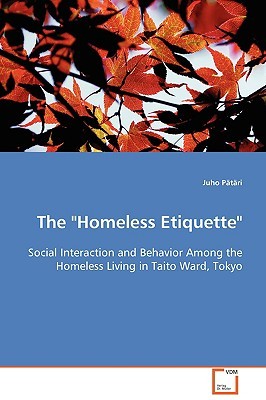
- Išsiųsime per 10–14 d.d.
- Autorius: Juho Pätäri
- Leidėjas: VDM Verlag Dr. Mueller E.K.
- Metai: 2008
- Puslapiai: 192
- ISBN-10: 3639090039
- ISBN-13: 9783639090031
- Formatas: 15.2 x 22.9 x 1 cm, minkšti viršeliai
- Kalba: Anglų
- Extra -15 % nuolaida šiai knygai su kodu: ENG15
The Homeless Etiquette - Social Interaction and Behavior Among the Homeless Living in Taito Ward, Tokyo + nemokamas atvežimas! | knygos.lt
Atsiliepimai
Aprašymas
The "Homeless Etiquette" Social Interaction and Behavior Among the Homeless Living in Taito Ward, Tokyo is based on ethnographic field research carried out in the autumn of 2003 in certain parts of Tokyo. The author of this MA thesis followed the daily lives of chosen groups of homeless people, sometimes participated in their actions, and did a number of open interviews. The field data is analysed using the aspects of Takie Sugiyama Lebra's theory of "social relativism". Lebra's theory is also critically reviewed. The thesis aims to clarify, how and why the interaction and behavior of some homeless individuals follow the aspects of Lebra's theory in some situations, and on the other hand, why in some situations they do not. A significant finding in the study is the so called "homeless etiquette", which appears to be an abstract set of norms and values that influences the social interaction and behavior of the homeless, and which many of the homeless individuals presented in the study seemed to comply with. The author argues that a deeper understanding of the daily lives of the homeless is needed for creating sustainable solutions to issues relating to homelessness in Japan.EXTRA 15 % nuolaida su kodu: ENG15
Akcija baigiasi už 2d.10:30:23
Nuolaidos kodas galioja perkant nuo 10 €. Nuolaidos nesumuojamos.

- Autorius: Juho Pätäri
- Leidėjas: VDM Verlag Dr. Mueller E.K.
- Metai: 2008
- Puslapiai: 192
- ISBN-10: 3639090039
- ISBN-13: 9783639090031
- Formatas: 15.2 x 22.9 x 1 cm, minkšti viršeliai
- Kalba: Anglų




Atsiliepimai